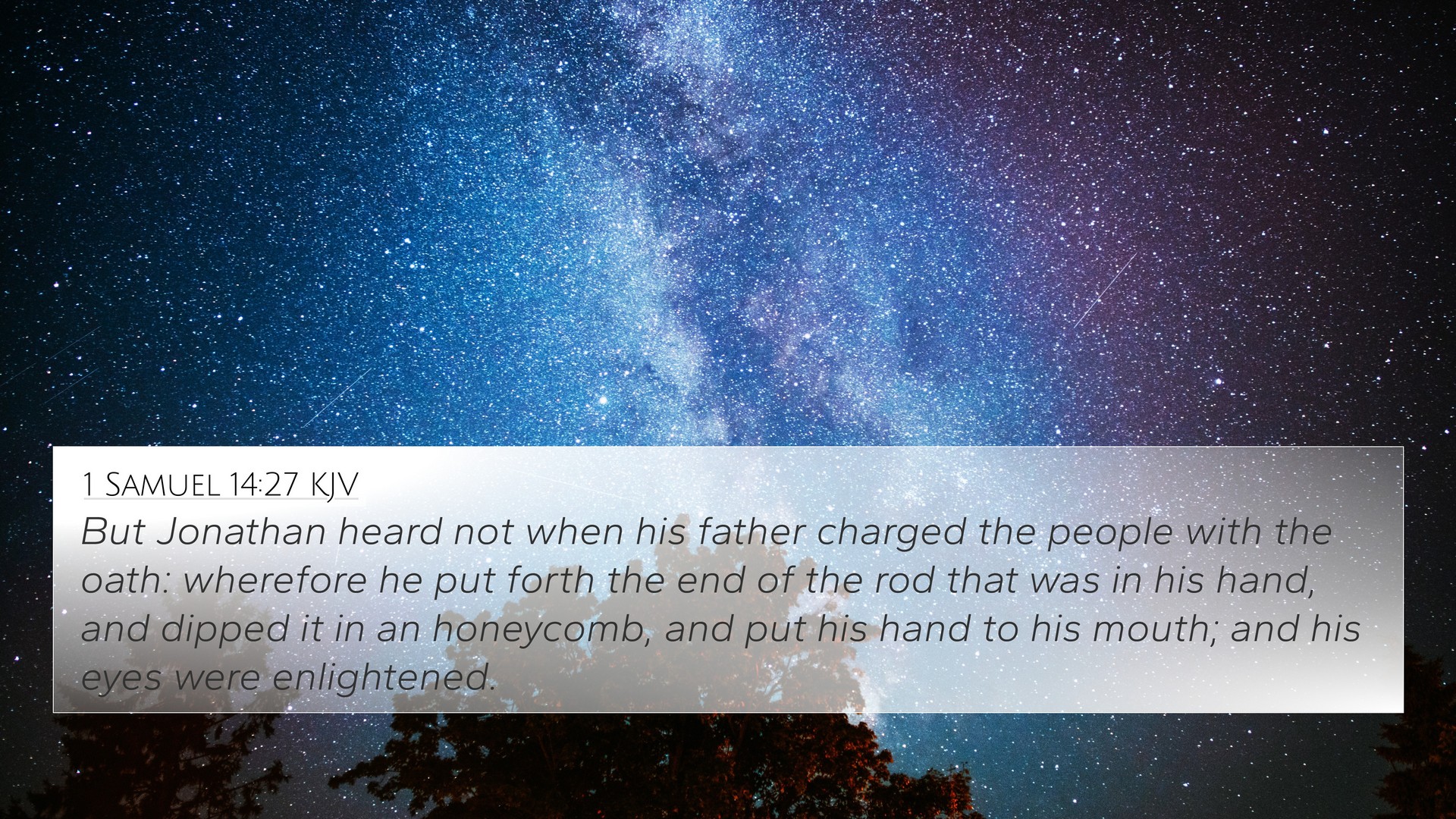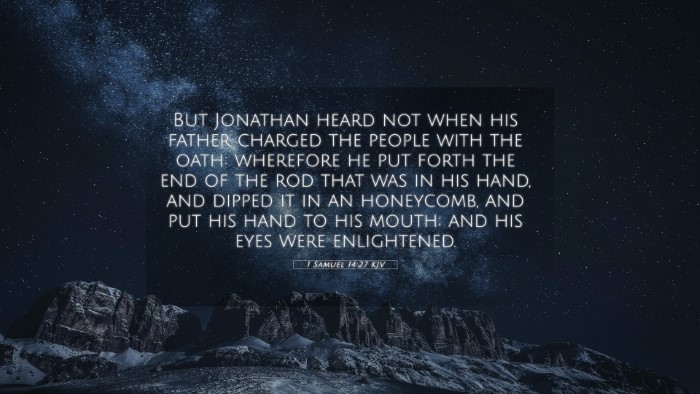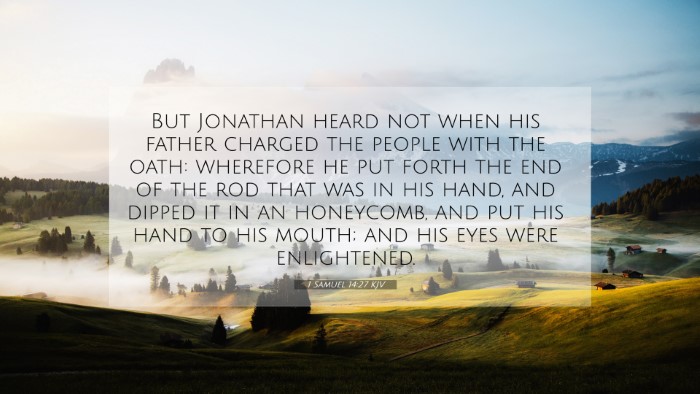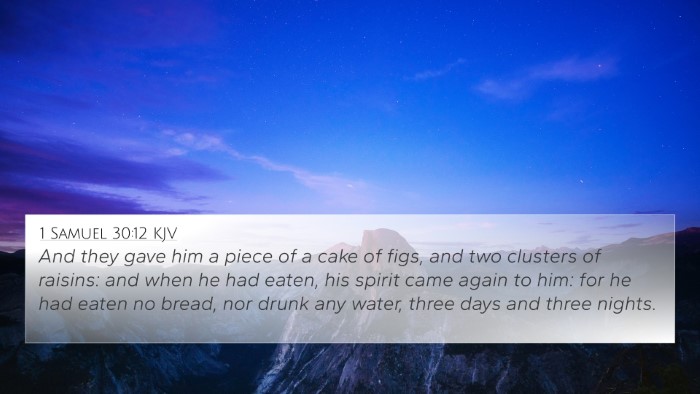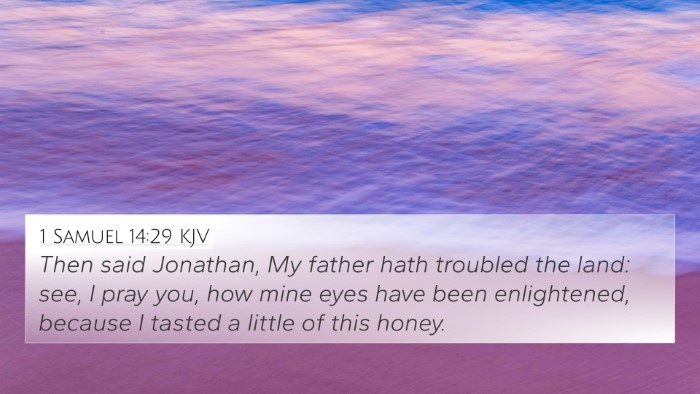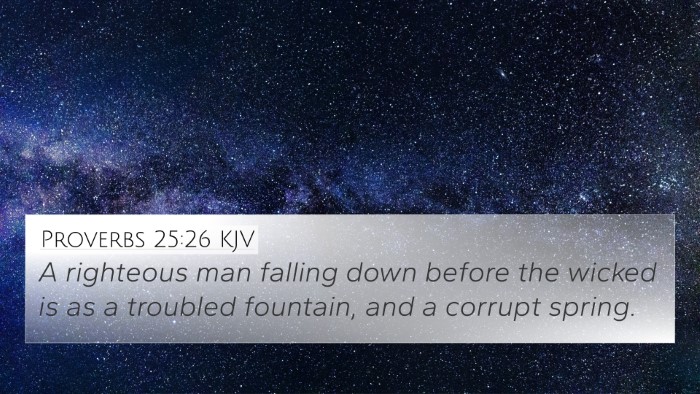Understanding 1 Samuel 14:27
Verse: "But Jonathan heard not when his father charged the people with the oath: wherefore he put forth the end of the rod that was in his hand, and dipped it in a honeycomb, and put his hand to his mouth; and his eyes were enlightened."
Overview
The verse describes a moment in which Jonathan, unaware of his father Saul's oath, consumes honey, restoring his vigor and clarity. This seemingly simple act holds deeper meanings relating to obedience, the consequences of leadership decisions, and the importance of divine guidance.
Commentary Insights
-
Matthew Henry's Commentary
Henry emphasizes the inadvertent nature of Jonathan's actions, reflecting on Saul's leadership as a source of restriction rather than nourishment. Jonathan's unknowing defiance leads to a refreshing revival, highlighting the contrast between his spirit and his father's burdensome commands.
-
Albert Barnes' Commentary
Barnes notes that Jonathan’s restoration upon eating honey represents a broader theme of God’s provision and illumination through wisdom. He explores the idea that spiritual hunger can be satisfied through God's Word, paralleling Jonathan's physical revival as analogous to spiritual enlightenment.
-
Adam Clarke's Commentary
Clarke elaborates on the significance of honey in Scripture, often symbolic of sweetness and divine providence. He draws connections between Jonathan's experience and the nourishment believers find in God's promises, stressing the importance of seeking strength through faith rather than imposing restrictions without understanding.
Thematic Connections and Cross-References
This verse connects with various Biblical themes and scriptures that highlight obedience, wisdom, and the significance of seeking divine sustenance. Below are cross-references that illuminate the thematic undertones of 1 Samuel 14:27:
- Proverbs 24:13-14: Compares knowledge and understanding to sweetness and nourishment, similar to Jonathan’s experience with honey.
- 2 Corinthians 1:24: Emphasizes encouragement and spiritual support rather than imposing burdens—parallel to Saul's heavy-handedness and Jonathan's liberation.
- Psalm 19:10: Mentions the Word of God as sweeter than honey, underscoring the sparking nature of divine insight and revelation.
- Matthew 5:6: "Blessed are those who hunger and thirst for righteousness," linking physical and spiritual nourishment.
- James 1:5: Advises believers to seek wisdom from God, reminiscent of Jonathan’s enlightened state post-consumption of honey.
- John 6:35: Jesus declares, "I am the bread of life," reinforcing the theme of looking to divine provisions for sustenance and understanding.
- 1 Peter 2:2: Encourages believers to long for pure spiritual milk, tying back into the idea of seeking nourishment for the soul akin to Jonathan's experience.
Lessons and Applications
This verse teaches invaluable lessons about leadership, obedience, and divine sustenance:
- Obedience to God's Word: Just as Jonathan was unaware of Saul's command, we may sometimes live beneath burdens not meant for us; God calls for our attentiveness to His guidance, distinguishing between divine law and human tradition.
- Seeking Divine Nourishment: Just as honey restored Jonathan, believers must recognize that true revival and enlightenment come from God's word, similar to Jonathan's act of seeking sustenance that was pure and nourishing.
- Impact of Leadership: Saul's oath illustrates how misguided leadership can constrain God’s people. Leaders are reminded to govern with wisdom and clarity, ensuring that their commands align with divine purpose.
Conclusion
1 Samuel 14:27 reveals profound truths about the intersection of obedience, wisdom, and spiritual nourishment. The spiritual parallels across various scriptures reinforce the message that God provides us with what we need to be restored and enlightened, emphasizing the importance of seeking Him and His commandments rather than mere human expectations.
Further Study
For those wishing to delve deeper into the connections between verses, utilizing a Bible concordance and a Bible cross-reference guide can enhance your study. These tools allow for thorough explorations into the connections between Bible verses, revealing a tapestry of divine insight and guidance throughout the Scriptures.
